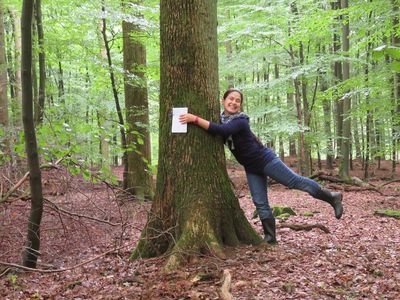- Akos Ivanyi, Ungarn
- Starford Mvula, Zambia
- Behruz Ilnazarov, Tadjikistan
- Lela Kakhniashvili, Georgia
- Carla Ocano, Uruguay
- Alfredo Rodriguez Zunino, Peru
- Rina Kristanti und Yayuk Siswiyanti, Indonesien
- Tibor Kadar, Rumänien
- Noor Hussein, Kenia
- Joaquin Garrido, Uruguay
- Lee Xiong, Laos
- Nehemia Gurusinga, Indonesien
- Edi Kurniadi und Kusdamayanti, Indonesien
- Myroslav Kabal, Ukraine
- Ekatherina Nevmerzhitskaya und Nikolay Nevmerzhitsky, Russland
- Le Xuan Toan, Vietnam
- Li Ming, China
- Ekaterine Balarjishvili, Georgien
- Gamin Gesa und Yopie Parisi, Indonesien
My experiences in the German Forests

by Carla Ocano, Uruguay
I live in Paysandú, a town in northern Uruguay. I work as a Technical Adviser in the Forest Management Division of the Department of Forestry (DGF) of the Uruguayan Ministry of Livestock, Agriculture and Fisheries (MGAP). With a burning ambition to improve my knowledge in Forest Management, I applied to participate in the Forest Expert Program in 2017 in Germany.
The first three weeks of my internship I stayed in Lower Saxony, surrounded by forest and heathland, in the Nature Park Lüneburg Heath. It was August so I could see the wonderful purple blooming of the heathlands.
The team of the Forest Expert Program and the different institutions which I visited, designed a very detailed and well-organized schedule of activities according to my work and expectations.
What I have learned about German Forest
In all the institutions and even when the people talk, it is very noticeable how valuable forests are for people in Germany. Germans love their forest and care about it, the forest is in the culture, in the literature, in the history and in their daily life. Having some forest, even a small one, is a signal of prestige. Here a natural protected area is managed, and with good results. Nearly all foresters have a license to hunt. For me, this was a very peculiar activity, in my country the people who hunt, do it only like a sport.
Currently the forests in Germany are in very good condition, the non-sustainable cut has been stopped and the monospecific forest is becoming a mixed forest with the integration of deciduous species. All this demonstrates the great contribution and good results of the legislation used, in addition to the correct administration of the new management companies.
The diversity of forest property is a challenge for the administration and regulation because all of them have different needs and managements. All these different actors have demonstrated to have a good relationship and have good mechanism to get the common target.
The education program of Lower Saxony State Forest proves to work well. The introduction of different didactic methodologies used by someone can be adapted to other conditions and is very useful.
The Lower Saxony State Forest respects the13 guiding principles of the LÖWE program to define all the forest management. It is an excellent example of conservation by using the correct management of the forest.
All the management types seen in Germany are characterized by having a long-term vision. In dealing with forests this is very important because the productive times are long, the lesson I learned is that a correct strategy cannot be obtained without a long-term vision, which should then be transferred to the management plans.
Compensation plans were presented in different companies, in which the “interventionist” causing some disturbance in the forest, or in the environment is forced to carry out a forestation, reforestation or a management to promote the good ecological characteristics of the forest in order to compensate negative effects. We learnt the importance given to forests and their services. The concept of sustainability was created by a German and is strongly rooted in the production processes observed. All stakeholders in the sector use it as a basic rule when working with forest.
What I take with me
The first thing to emphasize about my training stay in Germany are the people. During a month I visited different companies where I was always received in a very cordial way. Even leaders or managers of areas, including the presidents of associations dedicated a little of their valuable time to explain their work, everyone was looking for a way to answer my questions and provide me with reading materials. In particular Mr. Lutz Kulenkampff and Mrs. Sabine Kühling, they guided me throughout my stay in Germany, not only sharing all their extensive knowledge of their work areas but also with additional information to make my stay as pleasant as possible in a country so far and different to mine.
During my stay I had the chance to participate in several activities related to forest management in Germany, interacting with different institution and private companies. Thanks to these experiences, I realized that improving my knowledge and expertise in forest practices worldwide, is highly important to my professional development.
The training contents had different topics, which helped me to have a more holistic vision of the forest, with sustainable Forest Management emphasis and return to Uruguay to continue working within governmental institutions. In my country, these institutions still require professionals with higher education levels to improve their performance, especially in the forest area.
I keep on working on small towns, as I firmly believe that working with people is the way to make change happen. I look forward to use everything I learned in Germany, so I can make a positive contribution to my community.
Working in agronomic topics, forest or in rural areas used to be a men’s job, nowadays, while the differences have decreased, women still have far to go towards equal representation in agronomic related jobs and leadership. During my visit I could meet women working in topics related with forest, in different positions and activities, all of them role models for me. This was really inspiring; I hope to continue improving my training and in the future also be a reference for others.
In the future I would like to come back and be a part of a network of people who are working in forest and environmental issues. The experience gained, show me that to achieve the sustainable forest management, developing countries must learn from country with long-term experiences.
Carla Ocano

